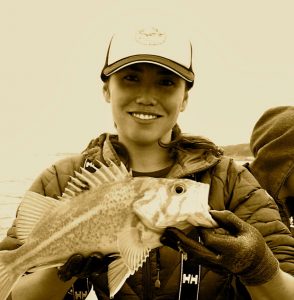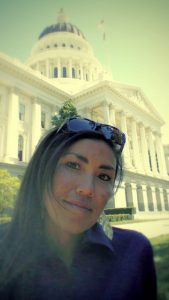Jahnava K. Duryea (2014)
Evaluating methods to anesthetize gopher rockfish (Sebastes carnatus) for immediate release in the field: induction, recovery, and cortisol stress response to surgical anesthesia

Jahnava graduated from the University of California Santa Cruz with a degree in Ecology and Evolutionary Biology. Before coming to Moss Landing Marine Laboratories, she worked as a subtidal technician for Partnership for Interdisciplinary Studies of Coastal Oceans (PISCO), conducting SCUBA surveys to monitor fish, invertebrate, and algal populations within kelp forests along the central coast of California.
She joined the Fisheries & Conservation Biology Lab at MLML in the summer of 2008, working as a research technician for the California Collaborative Fisheries Research Program (CCFRP), a tag and release project which works with local CPFV captains, commercial fishermen, and recreational anglers to monitor nearshore fish stocks inside and outside of recently established marine protected areas (MPAs).
Her research interests include kelp forest ecology, larval recruitment, scientific diving, and sustainable fisheries management. Her thesis work evaluated methods to anesthestize gopher rockfish, Sebastes carnatus, for acoustic tagging surgeries in the field. Immediate release sedatives were compared with a traditional anesthetic (MS-222) by tracking induction and recovery times, sub-lethal effects, and the cortisol stress response.
Upon completion of her master’s, Jahnava accepted a California Sea Grant Fellowship with the Delta Stewardship Council in Sacramento. There she played an integral role in drafting a white paper which examined completed levee-related restoration projects in the Sacramento-San Joaquin Delta. Her fellowship was filled with collaborative (and, in some cases, highly sensitive) interagency work involving interviews, data gathering, technical synthesis, and briefings. Her experience was especially formative in terms of analytical writing for broad audiences, which led to valuable recommendations for restoration practitioners, natural resource managers, and policy makers.
At the close of her fellowship, Jahnava accepted a position as a Fish Biologist at the Central Valley branch of NOAA’s National Marine Fisheries Service in Sacramento. She brings technical and field research experience to this position, as well as knowledge of the unique conservation challenges facing anadromous and native fishes along Delta levees. Her interpersonal and collaborative skills will foster strong relationships with agency project proponents and help to smooth compliance with Endangered Species Act (ESA) regulations surrounding habitat enhancement and flood protection efforts in the Delta.


